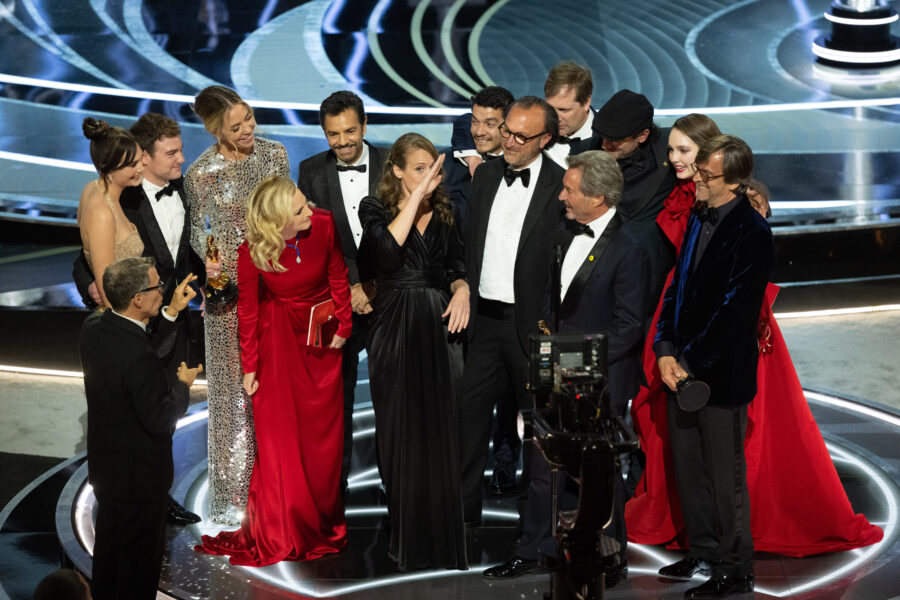After winning the coveted Best Picture award at the Oscars, CODA (Children of Deaf Adults) is set to be re-released by Apple across 600 screens in the US. The film’s win could prove to be a game changer and here, we explain how.
The Sian Heder-directorial bagged a total of three Academy Awards, including Best Adapted Screenplay for the director and Best Supporting Actor for Troy Kotsur, who became only the second actor from the deaf community to win an Oscar.
While accepting his Oscar for the screenplay, which is based on the 2014 French film La Famille Belier, Heder said, “This was an independent film, and it was incredibly hard to get made. Writing and making this movie was truly life-changing as an artist and as a human being. I want to thank all the collaborators in the deaf community and the CODA community for being my teachers.”
CODA tells the story of Ruby Rossi, the only hearing member in a deaf family. Ruby is the family’s sole interpreter, and she is torn between staying with her family and moving out to pursue a career in music.
The film’s win at the Oscars could prove significant for the deaf and CODA community, as well as for films in the feel-good genre.
Representation for actors from the deaf community

In a recent interview with Variety, Kotsur discussed his win and said that he would be working at a “fast-food restaurant or as a grocery bagger” had he not been cast in CODA.
“I was so tired of financially struggling for so many years. Now, receiving these awards — it’s saved my life, my career, my family. I’ve taken so many risks, and without these nominations and awards, I don’t know what would have happened,” the 53-year-old stage actor added.
Kotsur’s win made history as he became the first male deaf actor to win an Oscar, and only the second actor from the community to gain recognition at the Academy Awards. Marlee Maitlin, Kotsur’s co-star from CODA, was the first-ever deaf actor to win an Oscar, back in 1987.
While speaking about the film ahead of its premiere at the Sundance Film Festival, in 2021, Kotsur had said, “You have to think a little bit outside the box and present more opportunities, instead of just having two options,” and added, “You know, you write this script because somebody’s deaf, or I’m writing it because it’s a character that happens to be deaf. There’s a distinction there.”
CODA joins films like Eternals, Sound of Metal, and A Quiet Place that provide representation for actors from the deaf community. Its Oscar win could provide a boost for deaf actors and those with other disabilities.
Investment in films with a predominantly deaf cast

Even though CODA eventually went on to win the highest honour in cinema, its beginning was fraught with difficulty. Finding the funding, in particular, was no cakewalk. Heder recently told BBC, “We had no resources. I think my hope with this movie was, ‘Please let it sell, please let someone want it and distribute it and get it out in the world. And please let me make another movie.’ That’s where I was coming from.”
The production house that was initially supposed to back the project, pulled out, after Heder and Maitlin refused to cast a famous hearing actor. Months later, the team found independent funding, which in turn, allowed Heder to cast Kotsur.
Recommended
It was still a “scrappy production,” according to Heder. Her prayers were finally answered after Apple acquired the rights to the film at Sundance, for $25 million – the highest in the festival’s history. “We have now become a part of Hollywood, but this was definitely kind of an outsider film,” Heder said.
The film later debuted on Apple TV+ in August 2021, and was watched by over 370,000 people. Its viewership witnessed a boost post its Oscar nominations, in February, and around a million people watched CODA, according to a Deadline report. An Oscar win for CODA is thus expected to boost recruitment of deaf actors, as well as investment in stories with deaf characters.
Paves way for feel-good indie films at the Oscars

CODA is interestingly the first film, since 1932, to win the Best Picture with less than four nominations going in. The film gained traction with the Academy voters over time, despite not featuring the kind of cast to generate interest or coming from a popular production banner. The 1932 film Grand Hotel is the only film to have nabbed the Best Picture without being nominated in any other category, although it featured a formidable cast with many big names.
Also, it is notable that even though indie films like Nomadland have been able to win the top prize, very few slice-of-life films have been able to make a dent at the Oscars. [Read Silverscreen India’s list of slice-of-life films that have earned an Oscar nomination for Best Picture, here]
CODA thus paves way for feel-good films that have had a scarce representation at the Academy Awards, despite being one of the most beloved genres for audiences worldwide.



